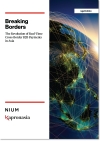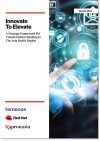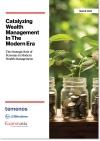Latest Insight
- Why cash is still prevalent in Asia
- Japan steps up green finance efforts
- South Korea charts middle path on crypto
- Should Grab and GoTo merge?
- Singapore pushes ahead with fintech-driven sustainability
- Digital banks in South Korea continue to thrive
- Billease is the rare profitable BNPL firm
- Fintech sector in Pakistan faces mounting challenges
- Where digital banks in Asia can make a difference
- Cashless payments jump in Vietnam
Latest Reports
-
Breaking Borders
 Despite progress in payment systems, the absence of a unified, cross-border Real-Time Payments (RTP) network means that intermediaries play a crucial role in facilitating connectivity. This report examines the ongoing complexities, challenges, and initiatives in creating a seamless payment landscape across Asia. Innovate to Elevate
Despite progress in payment systems, the absence of a unified, cross-border Real-Time Payments (RTP) network means that intermediaries play a crucial role in facilitating connectivity. This report examines the ongoing complexities, challenges, and initiatives in creating a seamless payment landscape across Asia. Innovate to Elevate In the dynamic and diverse financial landscape of the Asia-Pacific (APAC) region, banks are at a pivotal juncture, facing the twin imperatives of innovation and resilience to meet evolving consumer expectations and navigate digital disruption. Catalyzing Wealth Management In The Modern Era
In the dynamic and diverse financial landscape of the Asia-Pacific (APAC) region, banks are at a pivotal juncture, facing the twin imperatives of innovation and resilience to meet evolving consumer expectations and navigate digital disruption. Catalyzing Wealth Management In The Modern Era Hyper-personalized wealth management presents a paradigm shift from traditional models relying on static, generalized segments. Developing tailored investor personas based on psychographics, behaviours and fluid financial goals enables financial institutions to deliver rich and tailored customer experiences that resonate with next-generation priorities.
Hyper-personalized wealth management presents a paradigm shift from traditional models relying on static, generalized segments. Developing tailored investor personas based on psychographics, behaviours and fluid financial goals enables financial institutions to deliver rich and tailored customer experiences that resonate with next-generation priorities.
Events
| April 23, 2024 - April 25, 2024 Money 2020 Asia 2024 |
| October 21, 2024 - October 24, 2024 Sibos Beijing |
| November 06, 2024 - November 08, 2024 Singapore Fintech Festival |
The economic downturn fomented by the coronavirus pandemic has been a rude awakening for cash-burning fintech startups. They and their backers are finding that there's a price to pay for championing breakneck growth over profitability. In contrast, fintechs with solid balance sheets, like London-based digital money transfer firm TransferWise (profitable for three years in a row), are poised to pursue targeted expansion. Tapping resilient demand for its cross-border payments services, TransferWise recently inked a partnership with China's Alipay and expanded to the United Arab Emirates.
Libra is the most visible profile prong of Facebook's fintech offensive, but it may not be the most important. Not for now, anyway. U.S. officials and regulators remain circumspect about Facebook's digital currency project. Facebook has a long way to go before it wins their trust. In Asia, Facebook has a seemingly simpler task: Roll out the digital wallet of WhatsApp to monetize its large regional user base, concentrated in India and Indonesia. That's proving to be difficult too though.
In every crisis, there are opportunities. While many investors are tightening their belts during the coronavirus pandemic, some are opening their wallets. Now is the time to double down on certain investments. Take Australia's Airwallex as an example. The Melbourne-based cross-border payments platform closed a mammoth US$160 million (A$250 million) funding round in April, bringing its valuation to US$1.8 billion from US$1 billion. Less than half of the capital was raised in January, according to Australian Financial Review. Airwallex managed to raise the rest amid the pandemic's surge.
Xiaomi is the first Chinese smartphone maker to foray into digital banking. The Beijing-based firm secured a digital banking license in Hong Kong last year and began a trial period in late March. It also applied for a digital wholesale bank (DWB) license in Singapore, which allows the holder to provide non-retail banking services.
Finally after all the discussions about China's central bank digital currency, we're getting close to the actual launch as the platform goes into pilot.
The Philippines has long been one of the most promising Asian markets for fintechs. The archipelago of more than 7,641 islands has a population of nearly 107 million, second only to Indonesia among Asean countries. Nearly 70% of adults in the Philippines are unbanked, while smartphone penetration in the country is growing steadily. Given the Philippines' geography - with many people living far from retail banks - and development stage, fintech adoption can drive financial inclusion.
Digital banking had been growing steadily in the Philippines prior to the coronavirus outbreak. The pandemic hit the country in early March, resulting in the government implementing a lockdown in the metro Manila area beginning from the middle of that month. Some banks have seen online banking grow more quickly since the restrictions were imposed than previously. Rizal Commercial Banking Corp. (RCBC) posted a 117% increase in new sign-ups for its online banking services from March 17-26 according to fintechnews.sg. RCBC also recorded a 633% increase in the number of times its cardless ATM withdrawal function was used during that period.
2020 started well for Australia's neobanks. Deposit bases were growing quickly. Some Australian neobanks were on track to reach their deposit goals well ahead of their sales forecasts. That was before the coronavirus became a global pandemic. The virus has spread like wildfire globally in the past few months, sickening 2.5 million people and causing more than 170,000 fatalities. Australia has not become an epicenter of the outbreak, but it has still had to contend with thousands of cases and entered a strict lockdown on March 23. It is highly likely that the Australian economy will soon enter recession for the first time since 1991.
Under this scenario, neobanks may face a tough uphill climb. Grim economic conditions could affect Australians' willingness to switch their primary banking provider or even open a new account with a different provider.
Hong Kong issued eight digital banking licenses more than a year ago, but just one of the new virtual banks is fully operational, ZhongAn Insurance-backed ZA Bank. ZA Bank began operations this month after completing a mandatory trial in March. Three other Hong Kong digital banks recently began trials: Ant Financial's Ant Bank, Xiaomi and AMTD's Airstar Bank and Standard Chartered-backed Mox Bank. The other four Hong Kong digital banks have not announced when they will launch trials.
Initially, it seemed Hong Kong's virtual banks had arrived in the right place and at the right time. The city has plenty of banking options, but innovation among incumbents has been limited in recent years. Retail customers are eager for new digitally forward banking platforms. But last year's protests and the coronavirus outbreak have delivered a punishing blow to Hong Kong's economy. The city fell into recession well before the global economic malaise brought on by the coronavirus. Hong Kong's digital banks have struggled to gain momentum under these circumstances.
In early April, China's Starbucks rival Luckin Coffee was revealed to be a paper tiger. The company that was supposedly giving the U.S. coffee giant a run for its money in the world's largest consumer market had literally fabricated its success. To be sure, Luckin's 4,500 China stores - exceeding Starbucks' 4292 - were no mirage. But the company's sales figures were bogus. On April 2, Luckin publicized the results of an internal investigation showing RMB2.2 billion (US $311 million) in fraudulent sales from the second to the fourth quarter of 2019.
Here comes China's blockchain bandwagon, ready or not. The novel coronavirus may have slowed the Chinese economy down, but now that life is slowly returning to normal, blockchain hype is back. China currently has about 35,000 blockchain companies, according to information portal Tianyacha. In Guangdong Province alone, there are 20,000 of them. Even amidst the coronavirus pandemic, more than 2,000 new blockchain companies were formed between January and March, according to Forkast News.
Unsurprisingly, most of these firms are not focused on distributed ledger technology. Research by Forkast shows that just over 500 of them have a state-issued blockchain service filing number. Without one of those, a company is not a certified blockchain provider in China. China's 01 Think Tank found that about 1,000 of 30,000 blockchain firms in China are engaged in business that uses distributed ledger technology.
More...
Singapore-based Arival Bank is one of the less high-profile applicants for a digital bank license in the city-state. It's easy to get lost in the crowd when you're competing against names like Ant Financial, Xiaomi and ByteDance. Arival Bank, a fintech startup, has applied for the same digital wholesale bank (DWB) license as those Chinese tech giants. In a nutshell, that license allows the holder to serve non-retail clients in Singapore. The Monetary Authority of Singapore (MAS) has said it would issue three DWB licenses.
Across Asia, the cashless drive had been gaining momentum long before COVID-19 broke out in late 2019. In less than a decade, China, the region's largest and the world's No. 2 economy, has transformed from a cash-dominant into a cash-light economy. Its neighbors have been following suit.
A 2019 McKinsey study found that digital payments in Asia are growing at a roughly 15% annual clip, more than 2.5 times the typical economic growth rate in the region. Overall, cashless payments have been underpinning the rise of digital banking across APAC.
Asia may be at an inflection point for cashless payments as the coronavirus rages globally and hygiene concerns about the use of physical currency are growing.
China's ByteDance, best known as the owner of the popular TikTok video-sharing app, is reportedly now the world's most valuable startup with a US$75 billion valuation or more. That's quite a price tag. Of course, since the valuation is occurring in private markets, it is difficult to assess its accuracy. WeWork was once worth US$47 billion too. Now the company is fighting for its survival.
To be sure, ByteDance is on firmer footing than Adam Neumann's troubled company. In the quarter ended Dec. 2019, TikTok's short-video app revenue increased 310% annually, according to research firm Apptopia. Overall, ByteDance recorded between US$7 billion and US$8.4 billion in revenue in the first half of 2019, data from Reuters show.
The Kakao Talk messenger app's financial arm became the majority shareholder of Baro Investment & Securities in February, taking a 60% stake in the brokerage. This is the type of cooperation between incumbents and fintechs that Korea's Financial Services Commission (FSC) likes to see. Kakao is focusing largely on the underserved retail segment, with an eye on financial inclusion. Kakao could likely become the definitive Korean super app if its fintech business grows large enough.
Kakao is nearly as dominant in Korea as WeChat was in China when it moved into fintech. The Kakao Talk app has about 50 million active users in a country of about 51.5 million. Kakao Pay, which is already one of Korea's largest fintech platforms, has about 30 million registered users. Kakao Bank, one of the first two neobanks launched in Korea, has about 11.3 million customers.
On March 26th, Chinese internet giant Tencent’s messaging app WeChat launched a test version of a virtual credit payment product called Fenfu (分付). Fenfu, which literally means "installment payment," allows users unable to get a credit card from a bank to spend money first and later pay it back with WeChat. There is no fee for using Fenfu, which is focused on offline consumption. The virtual credit payment product does not support WeChat transfer and red envelope function.















